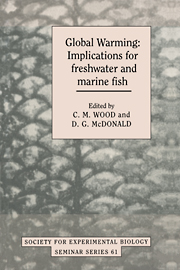Book contents
- Frontmatter
- Contents
- List of contributors
- Preface
- Temperature thresholds for protein adaptation: when does temperature start to ‘hurt’?
- Membrane constraints to physiological function at different temperatures: does cholesterol stabilize membranes at elevated temperatures?
- The effect of temperature on protein metabolism in fish: the possible consequences for wild Atlantic salmon (Salmo salar L.) stocks in Europe as a result of global warming
- Thermal stress and muscle function in fish
- Factors which may limit swimming performance at different temperatures
- Effects of temperature on cardiovascular performance
- Temperature effects on the reproductive performance of fish
- The effects of temperature on embryonic and larval development
- Temperature and growth: modulation of growth rate via temperature change
- Effects of climate change on cod (Gadus morhua) stocks
- Temperature effects on osmoregulatory physiology of juvenile anadromous fish
- Effects of temperature on xenobiotic metabolism
- Interactive effects of temperature and pollutant stress
- Behavioural compensation for long-term thermal change
- Thermal niche of fishes and global warming
- Index
Factors which may limit swimming performance at different temperatures
Published online by Cambridge University Press: 05 November 2011
- Frontmatter
- Contents
- List of contributors
- Preface
- Temperature thresholds for protein adaptation: when does temperature start to ‘hurt’?
- Membrane constraints to physiological function at different temperatures: does cholesterol stabilize membranes at elevated temperatures?
- The effect of temperature on protein metabolism in fish: the possible consequences for wild Atlantic salmon (Salmo salar L.) stocks in Europe as a result of global warming
- Thermal stress and muscle function in fish
- Factors which may limit swimming performance at different temperatures
- Effects of temperature on cardiovascular performance
- Temperature effects on the reproductive performance of fish
- The effects of temperature on embryonic and larval development
- Temperature and growth: modulation of growth rate via temperature change
- Effects of climate change on cod (Gadus morhua) stocks
- Temperature effects on osmoregulatory physiology of juvenile anadromous fish
- Effects of temperature on xenobiotic metabolism
- Interactive effects of temperature and pollutant stress
- Behavioural compensation for long-term thermal change
- Thermal niche of fishes and global warming
- Index
Summary
Introduction
As thermal diffusion is an order of magnitude more rapid than molecular diffusion, it is clear that the same design features that make the gills of fish well suited for respiratory gas exchange from water (large surface area, active convection of water and blood at appropriate ventilation/perfusion ratios across a functional counter-current) also provide for very effective branchial heat exchange. This is reinforced by the relatively high heat capacity of water which is more than 3000 times that of air, so that for most fishes, and indeed all other water-breathing ectotherms, body temperature equilibrates rapidly to any change in environmental temperature. Consequently, in the absence of specific anatomical specialization to maintain thermal gradients, temperature throughout the body of fishes is in equilibrium with the environment to within a fraction of a degree. Thus, large changes in body temperature may be experienced: diurnally, by coastal fish subjected to tidal variations; or by vertically migrating pelagic species, particularly if they cross a thermocline; or seasonally by eurythermal temperate zone fish. Over evolutionary time, speciation of tropical and polar fishes has resulted in species with widely different thermal ranges within the accepted biological temperature range (between the freezing point of water and the temperature for protein denaturation), which do not overlap.
As temperature, which is a measure of kinetic energy, directly affects the kinetics of both physical (for example, diffusion) and chemical (that is, biochemical) processes, changes in body temperature present major metabolic challenges, which require immediate physiological or biochemical compensation if the animals are to maintain relatively constant biological activity.
- Type
- Chapter
- Information
- Global WarmingImplications for Freshwater and Marine Fish, pp. 105 - 134Publisher: Cambridge University PressPrint publication year: 1997
- 24
- Cited by

